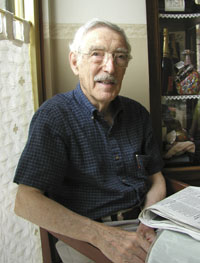Bruce Ames
| Bruce Ames | |
|---|---|

Ames in 2003
|
|
| Born | Bruce Nathan Ames December 16, 1928 New York City |
| Nationality | American |
| Fields | Molecular Biology, Biochemistry |
| Institutions |
University of California, Berkeley Children's Hospital Oakland Research Institute |
| Alma mater |
California Institute of Technology, Cornell University |
| Thesis | The biosynthesis of histidine in Neurospora crassa (1953) |
| Doctoral advisor | Herschel K. Mitchell and Mary B. Mitchell |
| Known for | Ames test |
| Notable awards |
Charles S. Mott Prize (1983) Tyler Prize for Environmental Achievement (1985) AIC Gold Medal (1981) Japan Prize (1997) National Medal of Science (1998) Thomas Hunt Morgan Medal (2004) |
Bruce Nathan Ames (born December 16, 1928) is an American biochemist. He is a professor of Biochemistry and Molecular Biology Emeritus at the University of California, Berkeley, and a senior scientist at Children's Hospital Oakland Research Institute (CHORI). He is the inventor of the Ames test, a system for easily and cheaply testing the mutagenicity of compounds.
Ames, raised in New York City, is a graduate of the Bronx High School of Science. His undergraduate studies were at Cornell University in Ithaca, New York, and his graduate studies were completed at the California Institute of Technology.
Ames was elected a Fellow of the American Academy of Arts and Sciences in 1970.
He is a recipient of the Bolton S. Corson Medal in 1980, Tyler Prize for Environmental Achievement in 1985, the Japan Prize in 1997, the National Medal of Science in 1998 and the Thomas Hunt Morgan Medal in 2004, among many others.
His research focuses on cancer and aging and he has authored over 550 scientific publications. He is among the few hundred most-cited scientists in all fields.
Ames' current research includes identifying agents that delay the mitochondrial decay of aging, understanding the role of mitochondrial decay in aging, particularly in the brain, optimizing micronutrient intakes in the population to prevent disease, malnutrition, and obesity. He is also interested in mutagens as they relate to cancer prevention and aging.
...
Wikipedia
